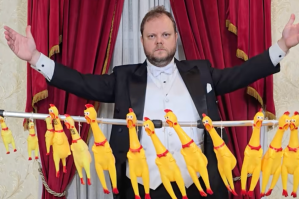Tags
More for You
-
Once a refugee seeking safety in the U.S., Anita Omary is using what she learned to help others thrive.
Even in divided times, small acts of friendship help create vibrant communities where everyone feels safe.
In March 2023, after months of preparation and paperwork, Anita Omary arrived in the United States from her native Afghanistan to build a better life. Once she arrived in Connecticut, however, the experience was anything but easy.
“When I first arrived, everything felt so strange—the weather, the environment, the people,” Omary recalled. Omary had not only left behind her extended family and friends in Afghanistan, she left her career managing child protective cases and supporting refugee communities behind as well. Even more challenging, Anita was five months pregnant at the time, and because her husband was unable to obtain a travel visa, she found herself having to navigate a new language, a different culture, and an unfamiliar country entirely on her own.
“I went through a period of deep disappointment and depression, where I wasn’t able to do much for myself,” Omary said.
Then something incredible happened: Omary met a woman who would become her close friend, offering support that would change her experience as a refugee—and ultimately the trajectory of her entire life.
Understanding the journey
Like Anita Omary, tens of thousands of people come to the United States each year seeking safety from war, political violence, religious persecution, and other threats. Yet escaping danger, unfortunately, is only the first challenge. Once here, immigrant and refugee families must deal with the loss of displacement, while at the same time facing language barriers, adapting to a new culture, and sometimes even facing social stigma and anti-immigrant biases.
Welcoming immigrant and refugee neighbors strengthens the nation and benefits everyone—and according to Anita Omary, small, simple acts of human kindness can make the greatest difference in helping them feel safe, valued, and truly at home.
A warm welcome

Dee and Omary's son, Osman Anita Omary was receiving prenatal checkups at a woman’s health center in West Haven when she met Dee, a nurse.
“She immediately recognized that I was new, and that I was struggling,” Omary said. “From that moment on, she became my support system.”
Dee started checking in on Omary throughout her pregnancy, both inside the clinic and out.
“She would call me and ask am I okay, am I eating, am I healthy,” Omary said. “She helped me with things I didn’t even realize I needed, like getting an air conditioner for my small, hot room.”
Soon, Dee was helping Omary apply for jobs and taking her on driving lessons every weekend. With her help, Omary landed a job, passed her road test on the first attempt, and even enrolled at the University of New Haven to pursue her master’s degree. Dee and Omary became like family. After Omary’s son, Osman, was born, Dee spent five days in the hospital at her side, bringing her halal food and brushing her hair in the same way Omary’s mother used to. When Omary’s postpartum pain became too great for her to lift Osman’s car seat, Dee accompanied her to his doctor’s appointments and carried the baby for her.
“Her support truly changed my life,” Omary said. “Her motivation, compassion, and support gave me hope. It gave me a sense of stability and confidence. I didn’t feel alone, because of her.”
More than that, the experience gave Omary a new resolve to help other people.
“That experience has deeply shaped the way I give back,” she said. “I want to be that source of encouragement and support for others that my friend was for me.”
Extending the welcome

Omary and Dee at the Martin Luther King, Jr. Vision Awards ceremony at the University of New Haven. Omary is now flourishing. She currently works as a career development specialist as she continues her Master’s degree. She also, as a member of the Refugee Storytellers Collective, helps advocate for refugee and immigrant families by connecting them with resources—and teaches local communities how to best welcome newcomers.
“Welcoming new families today has many challenges,” Omary said. “One major barrier is access to English classes. Many newcomers, especially those who have just arrived, often put their names on long wait lists and for months there are no available spots.” For women with children, the lack of available childcare makes attending English classes, or working outside the home, especially difficult.Omary stresses that sometimes small, everyday acts of kindness can make the biggest difference to immigrant and refugee families.
“Welcome is not about big gestures, but about small, consistent acts of care that remind you that you belong,” Omary said. Receiving a compliment on her dress or her son from a stranger in the grocery store was incredibly uplifting during her early days as a newcomer, and Omary remembers how even the smallest gestures of kindness gave her hope that she could thrive and build a new life here.
“I built my new life, but I didn’t do it alone,” Omary said. “Community and kindness were my greatest strengths.”
Are you in? Click here to join the Refugee Advocacy Lab and sign the #WeWillWelcome pledge and complete one small act of welcome in your community. Together, with small, meaningful steps, we can build communities where everyone feels safe.
This article is part of Upworthy’s “The Threads Between U.S.” series that highlights what we have in common thanks to the generous support from the Levi Strauss Foundation, whose grantmaking is committed to creating a culture of belonging.
-
Malala Yousafzai’s brother reveals beautiful sentiment about living in his sister’s shadow
“I’m not in my sister’s shadow. I’m in my sister’s light.”
Malala Yousafzai most certainly has a lot of light. At the young age of 11, she began advocating for education for girls after the Taliban took over her district of Swat in Pakistan. About three years later, she, (alongside two other girls) was shot in the head on a bus for her passionate, outspoken views.
She survived and went on to address the United Nations about the importance of education. From her non-profit’s website, “The U.N. recognized July 12 as Malala Day, in honour of her courageous advocacy and to highlight the global struggle for education. With her father, her ally and inspiration, she established Malala Fund, an organisation dedicated to giving every girl the opportunity to learn and choose her own future.”
Recently, one of her younger brothers, Khushal Yousafzai, was speaking at the Oxford Scholars Program when he was asked if he ever felt “overshadowed” by his sister’s accomplishments. His answer was vulnerable, heartfelt, and lovely. “My sister almost died. Forget her getting the Nobel Prize. Forget her getting the limelight. I would give up my life for you to have a life. Death puts things into perspective like nothing else does.”
He pauses and asks, “Why would her success take anything away from me? I’m not in my sister’s shadow. I’m in my sister’s light. And Rumi has this beautiful quote: ‘A candle doesn’t lose its light when it lights up another candle.’ It actually makes the world a brighter place. It lights up the whole room.”He continues with the message of supporting the people you love. “So guys, uplift each other. If you see your friend, uplift them. Because guess what? We all are gonna die someday. And your friends, I’m sure they mean a lot to you. And at times, there is that feeling of jealousy. You don’t want to be going to their funeral and telling their parents how amazing they were. Because guess what? It’s too late. So tell them while they’re still alive. You don’t want to live with that, so uplift people while they’re still here.”
Khushal speaks frequently to students about his journey. He is also a fierce advocate for education and finding the fuel to live life to its fullest. From the bio he shared with Upworthy: “Through his educational platform, Yousafzai Academy, he mentors students about personal and academic growth, learning from setbacks, and leadership.”
Many in the Instagram comments are beautifully supportive and touched by his words. “So beautiful to see his immense love for his sister shared so honestly, vulnerably, and without any hint of shame or resentment. And the Rumi quote is just so perfect. ❤”
Another notes that his wisdom isn’t surprising, considering that his whole family is involved in activism. “This family has got all the right things going on! What a gift to the world.”
This person was moved by his words, especially by the idea of uplifting people while there’s still time. “Wisdom. Beautiful. Fabulous. What a family! Uplift your friends. Uplift people while they are still here. Yes!”
And this commenter deduces from his clip that the trauma their family has been through has created a thoughtful empath. “You have a high level of empathy 🙏🏽💕. Only people who have come close to death know the depth of your words and the bond you share with your sister.”
-
In 1992, an Olympic sprinter got hurt during the race of his life. Then his dad stormed the track.
No one was going to stop Jim Redmond from getting to his son.
Starting in the mid to late 1980s, Derek Redmond was one of Great Britain’s top sprinters. One of his greatest accomplishments was helping to guide his team to a shocking victory over the United States at the 1991 World Championships. However, Olympic success eluded him due to injuries that forced him to pull out of the games in 1988.
But 1992 was going to be his year. The summer Olympics were being held in Barcelona and, despite all the surgeries and rehab he went through leading up to the events, Redmond was well-positioned to earn a medal for his country.
In the quarter-finals of the men’s 400m sprint, his chosen event, Redmond actually posted a personal best time and easily won his heat. That meant he got to move on to the semi-finals. If he could post a similar time in that trial, he’d be up for medal contention in the finals.

The 1992 Olympics were held in Barcelona. Photo by Douglas Schneiders on Unsplash Redmond’s semi-final race got off to a fast start, but with about 250m left to go in the race, tragedy struck. Redmond was spotted on camera slowing up and clutching the back of his right hamstring. It had torn. He was unable to run, and collapsed to the ground in pain. His Olympic dream was over once again.
Redmond was a proud competitor, however, and managed to peel himself off the track. He began to hobble and limp toward the finish line, determined not to earn a “Did Not Finish” disqualification. And that’s when an Olympic legend was born.
Redmond’s father, Jim, was caught on live television storming the track. Training and security personnel tried to restrain him, but there was no stopping this dad. He made it to his son and gave Derek a shoulder to lean on as both men stumbled toward the finish. Again, security tried to remove Jim, but he waved them off.
With his father’s support, Derek Redmond broke down in a powerful display of emotion. The physical pain likely couldn’t compare to the agony of watching his Olympic dream go up in smoke again. Still, the two men pressed on, and yet another Olympic official tried to intervene and was yet again waved off by the determined dad.
Eventually, the Redmonds were able to cross the finish line together to the roar of a standing ovation from the nearly sixty-five thousand spectators watching.
Unfortunately, Derek was still disqualified from the race as he had assistance in finishing. But that official Olympic record does not diminish his accomplishment, which continues to live on as one of the greatest Olympic moments of all time—even being officially recognized by the Olympics as such.
The moment was so powerful because it underscored the sacrifices made by both athletes and their parents. They train their whole lives for often just one opportunity to showcase their skills on the world stage. When it goes wrong, the results can be devastating. Win or lose, the parents are right there with them. Olympic fathers like Jim Redmond make immense sacrifices for their children to be able to chase their dreams, often spending a fortune on equipment and training, giving up career opportunities, family vacations, personal hobbies, friendships, and more to carve out enough time. Famously, gymnast Gabby Douglas spent two years living with a host family across the country from her parents so she could be closer to a top trainer. Other Olympic families spend $60-100,000 per year in training and equipment fees for their budding stars.
All the sacrifice and hope is on display in just this one short clip. The athletic displays at the Olympics are amazing to behold, but what we really fall in love with are the stories of persistence and perseverance, and there’s none better than the story of the Redmonds.
Derek Redmond rehabbed relentlessly after his injury but ultimately had to give up running—though he did enjoy a run as a professional basketball player before retiring from athletics altogether. His father, Jim, passed away in 2022, ten years after being honored as a torchbearer for the 2012 Olympics.
-
Brave 13-year-old swam 2.5 miles to shore, battling 4 hours to save his family swept out to sea
“I don’t think I am a hero—I just did what I did.”
A family in Australia is hailing their 13-year-old son as a hero after he saved their lives following a kayaking and paddleboarding expedition that saw them quickly drift miles off shore. Austin Appelbee bravely left his family (mother Joanne, brother Beau and sister Grace) floating in the waters of Western Australia on Friday, Jan. 30 to seek help in. The nearest land was almost four miles away.
“The wind picked up and it went from there,” Joanne Appelbee told BBC News. “We lost oars, and we drifted out further…. It kind of all went wrong very, very quickly.”
With every moment dragging the family further into the ocean, Joanne had to make a gut-wrenching decision: to ask Austin to attempt to swim ashore for help, knowing he may not survive.
A mother’s gut-wrenching decision
With conditions worsening and daylight fading, Joanne had to make one of the most difficult choices of her life.
“One of the hardest decisions I ever had to make was to say to Austin, ‘Try to get to shore and get some help, this could get really serious really quickly,’” she told the ABC News. “I knew he was the strongest and he could do it. I would have never went because I wouldn’t have left the kids at sea, so I had to send somebody.”
According to a statement from the WA Police Force, Austin “alerted authorities after he decided to return to shore in fading light and rough conditions. He paddled a short distance before his kayak took on water and swam approximately four kilometers (about two nautical miles) before reaching land.”
Naturaliste Marine Rescue commander Paul Bresland added that Austin swam for the first two hours with a life jacket on, calling his swimming “superhuman.” “And the brave fella thought he’s not going to make it with a life jacket on, so he ditched it, and he swam the next two hours without a life jacket,” he explained to ABC News.
The family had been stranded at sea for 10 hours when a rescue helicopter spotted Joanne and her two children clinging to a paddle board 8.5 miles offshore. A “volunteer marine rescue vessel was directed to their location and all three were successfully rescued and returned to shore.”
Joanne is also being hailed a hero for tethering herself and her kids to the paddleboard as they floated further and further out. “We kept positive, we were singing, and we were joking and … we were treating it as a bit of a game until the sun started to go down, and that’s when it was getting very choppy [with] very big waves,” she said. “As the sun went down, I thought something’s gone terribly wrong here and my fear was that [Austin] didn’t make it. Then, as it got darker, yeah, I thought there was no one coming to save us. It was the end, it was definitely the end.”
Austin Appelbee speaks
Austin shared more about his heroic battle to save his family.
“I started paddling to shore on the kayak … but it kept taking on water and I was fighting rough seas and then I thought I saw something in the water and I was really scared,” he shared with ABC News. “I was trying to get the happiest things in my head, and trying to make it through, [and not think of] the bad things that will distract me.”
Mentally, he had to keep himself locked in.
“And at this time, you know, the waves are massive, and I have no life jacket on … I just kept thinking ‘just keep swimming, just keep swimming,” he added. “And then I finally made it to shore, and I hit the bottom of the beach, and I just collapsed.”
However, the physical challenge was not over. Once he made it to land, Austin had to run two kilometers (about 1.25 miles) to the family’s parked car to call authorities on his mom’s cell phone.
“I said, ‘I need helicopters, I need planes, I need boats, my family’s out at sea.’ I was very calm about it,” he said, adding that “nice ladies on the beach” were able to offer him food before he “just passed out.”
Days later, Austin was using crutches to help him walk on incredibly sore legs. Despite the physical exertion and trauma, he remained humble about the ordeal.
“I don’t think I am a hero—I just did what I did,” he told BBC News.
-
‘Remarkable’ UPS driver runs into burning home to save 101-year-old woman
“I just did what I thought was right.”
Fate often tests our courage at the most unexpected times. For UPS driver Willy Esquivel, that moment came on January 15 while he was completing a delivery in Orange County, California.
According to KTLA, Esquivel was on his routine route in Santa Ana when he noticed neighbors attempting to smother a blaze coming from the condo of Ann Edwards, a 101-year-old woman who lives alone.
Esquivel wasted no time entering the smoke-filled building to rescue Edwards, who seemed “very disoriented” and reluctant to leave. Nevertheless, Esquivel “picked her up and carried her safely outside,” according to KTLA and a statement from the Orange County Fire Authority (OFCA).
A video posted on the OFCA’s X account showed just how thick the smoke was pouring from Edwards’ condo as firefighters arrived. The OFCA also acknowledged the resourceful neighbors who aided in the rescue.
“At the same time, the neighbors used fire extinguishers to knock down the kitchen fire,” the OCFA wrote on X. “One of them, a roofer by trade, grabbed his ladder, climbed to the roof, and used a garden hose to spray water into the kitchen vent.”
Thankfully, while Edwards was taken to the hospital, she was expected to make a full recovery. Her son, Rick, told KTLA that he was grateful to Esquivel for “sticking with her and getting her out of there.”
As for Esquivel, rather than seeing himself as a hero, he told KTLA that he was “just a UPS driver who was in the right place at the right time.”
“I just did what I thought was right,” he added. “At the end of the day, she’s someone’s mother, someone’s grandmother, great-grandmother.”
Moments like this rarely announce themselves ahead of time. They unfold in the middle of ordinary days, on familiar streets, while people are simply doing their jobs or moving through their routines. Delivery drivers like Esquivel travel through neighborhoods every day, often unnoticed, yet uniquely positioned to sense when something is wrong. On this day, being present and paying attention made all the difference.
Just as striking as Esquivel’s bravery was the way neighbors instinctively sprang into action. Without hesitation, they grabbed fire extinguishers, ladders, and garden hoses, each contributing whatever they had in the moment. Together, their quick thinking and collaboration helped prevent an even greater tragedy.
“A remarkable outcome made possible by quick action, teamwork, and people looking out for one another in a moment of need,” the OCFA wrote on X.
It’s easy to assume someone else will step in. That it’s not your fight. That it’s not your responsibility. Heroism requires the opposite mindset. And at a time when the world can feel increasingly short on that quality, this story is a refreshing reminder that yes, there are still good people out there willing to help, even when it means helping complete strangers while on the job.
-
People love this 1983 clip of a southern grandma feeding her community from her modest kitchen
“I always get what I want, but I know what to want,” she said.
History remembers extraordinary people who accomplish great things, lead big movements, create new inventions, and make an indelible mark on the world. But what about the individuals who dedicate their time and energy to making their local community, however small, a better place?
Those everyday heroes rarely get lauded in posterity, but thanks to human interest stories, some people get the flowers they never asked for long after they’re gone. Enter Agatha Burgess, an 80-year-old grandmother who, in 1983, had a visit from CBS Evening News as she went about her normal weekday business of feeding her community, simply because she could.
In the footage from the archives, Burgess is shown bopping about her modest kitchen, where she’s been working since 5:00 a.m. She’s surrounded by pans and tins and bowls, which she’s using to make corn muffins, rice, dressing, peach cobbler, and more for residents of her small town of Buffalo, South Carolina. She’s done this for 15 years, not as a business, but as a service to her community. She said she didn’t have any desire for a “big, fine home” and that she’d always wanted to “live by the side of the road and be a friend to man.”
“I always get what I want, but I know what to want,” she said.
Some meals were sent out to shut-ins in the community, delivered by Meals on Wheels volunteers. She made sure those meals were always ready by 11:00 a.m. After that, people also came to her home to get a meal. If they were able, they’d drop $2.75 per meal into a box on the side table to cover the costs, even making their own change on the honor system. But no one was ever turned away if they couldn’t pay.

Apparently, Agatha Burgess's corn muffins were legendary. Photo credit: Canva Burgess didn’t have a large home, so people would crowd into her dining room and kitchen to eat the home-cooked meals she made single-handedly. After people had eaten and left, she would do the dishes and start on her baking for the next day. This was her life from 5:00 a.m. to 10:00 p.m., five days a week.
Why? Because she loved doing it. She said, “This guy asked me the other day, said, ‘Miss Burgess, why don’t you stop and rest?’ I said, ‘What would I have to live for?’ Because these people come in every day. They mean so much to me. I just love. I fall in love with people.”
Her sister said she might end up regretting the honor box, that someone would end up ripping her off. But Burgess said that God had always taken care of her, and if someone stole from the box, God would take care of them, too.
Burgess’s quote about being “a friend to man” comes from the poem “The House By The Side Of The Road” by Sam Walter Foss, the last stanza of which reads:
Let me live in my house by the side of the road,
Where the race of men go by-
They are good, they are bad, they are weak, they are strong,
Wise, foolish – so am I.
Then why should I sit in the scorner’s seat,
Or hurl the cynic’s ban?
Let me live in my house by the side of the road
And be a friend to man.People loved hearing about Burgess’s extraordinary retirement in the resurfaced clip from the CBS News archives:
“She has the best attitude about life. She is so grateful for what she has.”
“This is one of the most wholesome things I’ve ever seen.”
“‘I don’t want your big fine home. But I’m glad you got it.’ There’s beauty in being content with what you have, and being happy for people. What a sweet lady.”
“‘I always get everything I want, but I know what to want’ might be the wisest thing I’ve ever heard.”
“What a wonderful woman. My dad used to eat there for lunch while working his first job out of college. God bless.”
“I’m a grown man and I’m sitting here watching this crying. I know you’re no longer with us, but God bless you, Agatha. Did you ever realize all the lives you blessed?”
Burgess died in 1992 at the age of 89. Though she didn’t spend nearly two decades cooking for friend and stranger alike in order to get praise or accolades, there’s something truly beautiful about people seeing her service over four decades later and giving her the flowers she deserved.
-
Why Buddhist monks (and one very good rescue dog) are walking 2,300 miles across America for peace
Their dog Aloka, once a stray rescued by a monk, has become a symbol of resilience and light.
It was a normal winter’s day in Charlotte, North Carolina, when the Buddhist monks came to town. Soft gray clouds blanketed the city without a trace of wind in sight. A few people complained about the 96% humidity, while others put their heads down and went on with their damp day.
Then, like a scene from a movie, there they were: a single-file line of men, each wearing flowing saffron and ochre-colored robes, steadily marching along the shoulder of the highway. Some wore sandals while others cheerfully went ahead barefoot. Trotting alongside them—and at times, leading them—was a scruffy, tousle-haired rescue dog eagerly wagging his tail—Aloka, whose name translates to “Divine Light” in Sanskrit.
In October 2025, approximately two dozen Buddhist monks hailing from various Theravada Buddhist monasteries across the globe, along with Aloka, embarked from Fort Worth, Texas, on a 2,300-mile pilgrimage to Washington, D.C. This “Walk of Peace,” and the participating 18 monks, stand on the shoulders of giants: the countless of those who came before them in this time-old tradition of spiritual activism through walking meditation, from the Buddha himself to Gandhi’s groundbreaking 240-mile “Salt March” in 1930, to Dr. Martin Luther King’s immortalized March on Washington in 1963 and the marches from Selma to Montgomery in 1965.
The journey, expected to conclude in mid-February 2026, has attracted millions of social media followers and drawn thousands of participants to major stopping points, transcending the religious and political divide during a period defined by deep division.
A pilgrimage of resilience
The journey began in Fort Worth, Texas, on October 26, 2025, at Huong Dao Vipassana Bhavana Center, the Vietnamese Buddhist temple that organized the Walk for Peace. It’s also the Venerable Bhikkhu Pannakara’s home temple, who serves as the group’s spiritual leader and primary spokesperson.
While this is Pannakara’s first pilgrimage in the States, the Vietnamese Theravada Buddhist monk has reportedly walked across several South Asian countries, including a 112-day walk across India in 2022, where he met Aloka, the stray dog that’s become somewhat of a mascot for the walk. Aloka has been with Pannakara ever since.

Monks offer blessings to people lined up to see them. Credit: Des Moines Register In a written statement to USA Today, Pannakara encourages others to reframe the purpose of their mission. “We walk not to protest, but to awaken the peace that already lives within each of us,” he writes.
He continues: “The Walk for Peace is a simple, yet meaningful reminder that unity and kindness begin within each of us and can radiate outward to families, communities, and society as a whole.”
He means it. For Pannakara, this walk represents a national act of healing rather than a political statement. At every stop, he offers lessons about mindfulness, peace as an inner quality, forgiveness, healing, unity, and the importance of meeting people where they are.
2,300 miles is no walk in the park
The journey hasn’t been easy—though that was never the point for this group. As if walking 2,300 miles across ten states wasn’t difficult enough, Pannakara and the other Theravada Buddhist monks live in accordance with the earliest teachings of the Buddha and dedicated themselves to extreme monastic living and to following strict Buddhist codes of living.
As a result, the monks sleep in tents and rely on the kindness of strangers for shelter or sustenance. They’ve faced the physical reality of walking on asphalt for months. Then, in November, tragedy struck near Dayton, Texas. An escort vehicle was hit, resulting in an accident where one monk was severely injured and lost a leg.
Yet, the group continued.
At their stop Thursday in Saluda, South Carolina, Audrie Pearce—who had driven four hours from her village of Little River to see them—teared up as Pannakara handed her a flower.
“There’s something traumatic and heart-wrenching happening every day in our country,” Pearce told Newsday. She describes herself as spiritual, but not religious. “I looked into their eyes, and I saw peace. They’re putting their bodies through such physical torture, and yet they radiate peace.”
Aloka, the four-legged peacekeeper
While the monks inspire reverence, the true celebrity of the group might just be their canine companion.
Aloka is an Indian Pariah dog, a breed known for its intelligence and loyalty. His story with Bhikkhu Pannakara began thousands of miles away in India during a previous peace walk. When Aloka fell critically ill as a puppy, Pannakara carried him and nursed him back to health.

Thevada Buddhist monks greeting fans on their Walk for Peace. Credit: Des Moines Register Now, the roles have reversed. Aloka is the one keeping spirits high. He happily trots alongside the monks, offering a furry reminder of loyalty and joy. When the group reached North Carolina, locals didn’t just bring water for the monks; they brought dog treats for Aloka.
Strangers becoming neighbors
Perhaps the most beautiful part of this journey is how it has brought people together. As the monks traverse states like Mississippi, Alabama, and the Carolinas, they have been met not with suspicion but with overwhelming hospitality.
The Herald shared stories from people in the crowd as the monks traveled through Rock Hill and Fort Mill on their way to Charlotte.
“I like the idea of peace, and I’m concerned about the state our country is in,” said Penny Sheppard of Rock Hill, as she waited for the monks to walk by. “The peace walk exemplifies where we could be…. I just want to support them… They just impress the heck out of me.”

The monks as they enter North Carolina. Credit: 7News Stevie Goudui of Fort Mill echoed this sentiment. “We could definitely use a little more peace in the United States right now,” he said.
Then, from Rock Hill resident Carolyn Hall: “No matter your religion, it makes sense that the purpose of the walk was for peace,” Hall said.
“Women, children, people getting killed. It’s a sad day in America right now,” she added. “I think it’s great what (the monks) are doing. I love it, and I just want to be a part of it.”
Streets lined with onlookers on a cold, wet Wednesday made for an emotional morning. “That really touched my heart,” said the Venerable Bhikkhu Pannakara. “These days, you all make me cry so much. A lot. But happy tears. Joy.”
A quiet request for a national holiday
While the spiritual goal is paramount, the monks do have a tangible objective for their arrival in the nation’s capital. Upon reaching Washington, D.C. in mid-February, they plan to ask Congress to recognize Vesak—the day celebrating Buddha’s birth and enlightenment—as a federal holiday.
The hope is that recognizing Vesak will officially acknowledge a day dedicated to reflection, compassion, and unity for all people, regardless of their faith.
Judging by the overwhelming response to the Walk of Peace, the monks will always have the public’s support, regardless of the outcome in Congress.
The viral trek gained more than one million followers on both Facebook and TikTok since the monks started walking in October. Even Aloka the dog has enjoyed Internet stardom, gaining 752,000 followers on Facebook.
“Together, we are proving that peace is not just a dream—it is alive, it is real, and it is growing stronger every single day,” Walk for Peace organizers posted to Facebook.
Finding your own “peaceful day”
You don’t have to walk 2,300 miles to feel the impact of this journey. The monks’ message is that peace is accessible to everyone, right where they are.
Becki Gable, a woman grieving the loss of her daughters and parents, drove nearly 400 miles to meet the monks in Saluda, South Carolina.
“I just felt in my heart that this would help me have peace,” she told a local news station. “Maybe I could move a little bit forward in my life.”
She spoke about how the encounter helped her move forward, adopting a simple practice suggested by Bhikkhu Pannakara. Every morning, she writes down five words: “Today is my peaceful day.”
You can follow the monks on their journey to Washington, D.C. through their live tracker here.
-
Resurfaced interview shows Mister Rogers beautifully reflecting on how he wanted to be remembered
Mission accomplished.
It’s not especially unique to state how extraordinarily lovely and special Fred Rogers was. He was a gentle, thoughtful man who seemed to want to make the world a little bit better every day. And it wasn’t just the years on his PBS show Mister Rogers’ Neighborhood or the magical make-believe lands he built for kids (and quite frankly) their parents. He worked extensively to study the minds of children so he could help them feel heard, all while simultaneously advocating for them in educational spaces.
In addition to being a beloved TV figure, he was a champion for entire families and he put his expertise to good use. A recent interview clip from the Television Academy making the rounds proves that he was not only unbelievably kind, but that his humility seemed to know no bounds.
In the clip, Rogers is asked how he wants to be remembered.
At first pensive, Rogers starts by sharing a story about another famous celebrity (whose name he omitted), who had asked, “Do you think I’ll be remembered?” Rogers thoughtfully responds with, “I’m sorry that he had such misgivings about that, you know?”
As for himself, the legacy he wanted was simple: “I’d just like to be remembered for being a compassionate human being. Who happened to be fortunate enough to be born at a time that there was this fabulous thing called television that could allow me to use all the talents that I’d been given.”
The video has so far garnered over 2,000 lovely comments. One person writes, “Mere seconds into this video and I’m already crying. I just adored him. I didn’t have other kids to interact with until I went to kindergarten, so I’m pretty sure he was my first friend.”
Another shares quite simply, “A good man. A good human. That’s how I’ll always remember Mr. Rogers.”
Another, commenting on the hardships of today’s world, had a positive spin—perhaps not unlike how Mister Rogers himself would have framed it: “He would be so disappointed in the world right now… but he’d still show up, slip into his house shoes, a comfortable cardigan, and walk us through emotionally processing the negative spaces, finding the helpers, and reminding us that we’re all in this together. I miss him.”
The clip was a part of a longer interview wherein Rogers discusses his childhood, his family, and how the “land of make-believe” came about on his popular PBS show, among many other fascinating revelations.
He shares the importance of inspiring others by actually caring about what you’re teaching: “When I was a senior in high school, a friend of mine taught me to fly in a little Piper Cub. And he was so enthusiastic about flying, I know that’s why I wanted to learn. The best teacher in the world is someone who loves what he or she does. And just loves it in front of you.”
He explains how he carried this idea over to Mister Rogers’ Neighborhood, saying, “And that’s what I like to do with the neighborhood. I love to have guests and just create a whole smorgasbord of ways for the children to choose. I mean, some child might choose painting. Some child might choose playing the cello. But there are so many ways of saying who we are and how we feel. Ways that don’t hurt anybody. And it seems to me that that’s a great gift. Well, television can do that all the time!”
He digs a bit deeper into the majestic make-believe land and what he drew from to create it: “King Friday thought it would be nice to have a wife. And so Queen Sarah came along. Her name was Sarah Saturday. And it gave us a chance to have a wedding on the neighborhood. It gave us a chance to have the birth of a child. To deal with that. And there was Harriet Elizabeth Cow. And Sarah, of course, was the first name of my wife. My wife’s name was Sarah Joanne. So of course she would be the queen.”
-
Pizza guy delivered in a dangerous blizzard for a $2 tip. A cop saw and changed his life.
“This man walked through hell and high water to deliver a pizza.”
A story from Indiana illustrates a point we often make on Upworthy: even though some people do wrong, there are far more folks willing to do what’s right. Back in January, Connor Stephanoff, an employee for Rock Star Pizza in Indiana, braved his way a half mile through a snowstorm wearing sneakers and sweatpants to deliver $40 worth of pizza to a home in an affluent neighborhood.
All he got for a tip was $2.
Officer Richard Craig, who goes by Officer Craig on TikTok, saw the deliveryman’s incredible effort to get the pizza to the right home, recorded it on video, and posted it to TikTok. His dedication astounded the officer, but he couldn’t believe how the young man was treated. “Look at this man. This man walked through hell and high water to deliver a pizza,” Craig said in the video. But he was shocked to learn how cheap the tip was. “Absolutely insane. Do better, folks,” he said.
People can’t believe that he only got a $2 tip
Commenters were appalled:
“2.00?????? I would never tip someone only $2.00, no matter the day. Ridiculous”
“Unwritten rule- If the weather is preventing YOU from driving to get your order don’t make someone else do it. Or at least tip generously!!!”
“Damn, I don’t tip $2 on a normal day. I hope The person that did this sees this is and is ashamed.”
NerdWallet suggests that people tip a pizza delivery person the amount they’d pay for a regular sit-down dinner, 15% to 20%. However, it notes that you should add more if the pizza is delivered in poor weather conditions. So, in this situation, the people who received the pizza should have at least tipped $7, which is still cheap considering the weather.
The officer then posted a follow-up video (since deleted) that gave a better look at the icy terrain Stephanoff had to walk through. He noted that he was in an affluent neighborhood where most people should be able to afford a decent tip, especially for a guy who went above and beyond.

A woman tipping the pizza guy. via Canva/Photos Craig started a GoFundMe campaign for Stephanoff
“I witnessed firsthand the work ethic, dedication, and determination by this young man while I was on the scene of a crash during Friday’s snowstorm here in Indiana,” he wrote on the GoFundMe page. “He received just a $2 tip – from a home in a very affluent neighborhood.”
“I ran to my police vehicle to grab my wallet to give him the little cash that I had (about $15) which I didn’t feel is enough,” he added. “I would LOVE to raise at least $500 for this guy!”
The fundraiser has earned him $45,575. “Thank you all for your kindness and donations!” Stephanoff wrote on the GoFundMe page.
Stephanoff’s heroic effort to deliver a pizza earned him praise from his boss, Rock Star Pizza manager Ron Mathews. “He wasn’t here in the restaurant; he had no idea people were watching him. But he got out, walked it to the house, and came back without any expectations,” Mathews told WRTZ.
The pizzeria’s owner also noted that he could have taken the day off due to the weather. “At no point did we force anyone to come to work or deliver. There is no pressure or implication that there will be repercussions for not coming to work due to weather.”
After Stephanoff saw the donations racking up, he couldn’t believe it. He told Today.com that he planned to use the money to buy a car so he wouldn’t have to use his grandmother’s. He would also like to use some of it to pay for his education.
Matthews told NBC affiliate WSAZ that Stepahnoff’s story is a reminder that many folks have it rough these days and to look out for one another. “Everyone is going through it tough. Everyone has it. It could be you. It could be the delivery driver. But at the end of the day, we’re all people,” he said. “Just be nice to the next person.”
This article originally appeared last year. It has been updated.

















